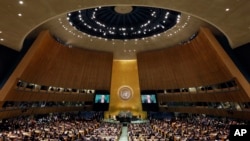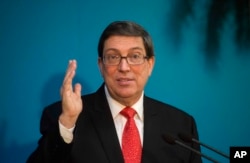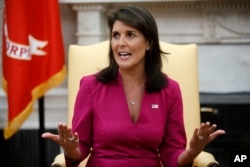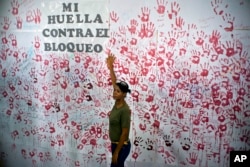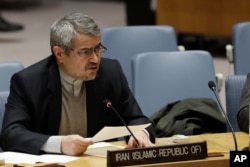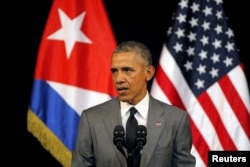U.N. member states overwhelmingly supported lifting Washington's more than half-century-old economic, commercial and financial embargo of Cuba on Thursday, saying it is the main impediment to the island nation's economic and social development.
"The embargo is a flagrant massive and systematic violation of human rights of Cuban men and women," Cuba's Foreign Minister Bruno Rodriguez Parrilla told the General Assembly. "It has been, and still is, the main obstacle to well-being and prosperity of several generations."
The assembly voted 189 in favor of ending the blockade, with only the United States and Israel in favor of continuing it. No country entered an abstention, while Moldova and Ukraine were present but did not cast votes.
"There are no winners here today, there are only losers," U.S. envoy Nikki Haley said. "The United Nations has lost. It has rejected the opportunity to speak on behalf of human rights. The U.N. Charter commits every country here to the promotion of peace, security and human rights and that charter was betrayed today."
For the past 27 years, the U.N. General Assembly has held an annual vote condemning the economic, commercial and financial blockade that was imposed in 1962 during the Cold War.
The exercise is largely symbolic, as the General Assembly does not have the power to end the embargo, only the U.S. Congress does. But it highlights Washington's isolation on the issue. Ambassador Haley said the United States doesn't care if it is isolated.
"We have no problem standing alone on behalf of the things we believe in, and we will proudly do so again today if necessary," Haley said ahead of the vote.
More than thirty-six countries and regional groups took the floor, with a debate that began on Wednesday and concluded Thursday with the vote. Many argued the embargo runs contrary to the U.N. Charter and the organization's principles.
"Every attempt to justify this embargo has failed to convince 191 member states," said Ambassador Rhonda King of the Caribbean island-nation of St. Vincent and the Grenadines. "It is an affront to us all that the legislature of one country can make a decree on trade matters of another, thereby affecting third countries."
"The blockade is a vivid example of the unilateral way in which the United States acts in the world," said Iranian Ambassador Gholamali Khoshroo. His country is also under U.S. sanctions re-imposed by the current administration.
"It is not justifiable to apply sanctions in perpetuity," said Kenyan envoy Lazarus Amayo. "In the long run, they are unsustainable and largely cause pain and suffering to the weak and vulnerable members of society," he added.
This year, the U.S. tried a different strategy, offering up eight separate amendments focused on Cuba's human rights situation, in a bid to lessen the emphasis on the embargo. But all eight amendments failed to garner more than a few votes in favor and were not adopted.
Haley argued the annual General Assembly exercise is "a waste of everyone's time" and does nothing to help the Cuban people.
"Cuba and its allies do the same thing every year. They propose a resolution blaming Cuba's poverty, repression, and lack of freedom on the United States," she said. "But this resolution changes nothing. It doesn't help a single Cuban family. It doesn't feed a single Cuban child. It doesn't free a single Cuban political prisoner."
In 2016, there was a brief shift in the U.S. position under former President Barack Obama. The United States abstained that year on the vote, as the Obama administration worked to normalize ties with Havana. Obama's efforts included making an historic trip to the island nation and reopening the U.S. embassy there.
But relations chilled again under President Donald Trump. He has blamed the Cuban government for the mysterious sonic attacks that sickened and injured more than two dozen U.S. diplomats and others in Havana that began in late 2016. The most recent suspected case happened in June this year. U.S. investigators still do not know exactly who and what caused the injuries, but 15 Cuban diplomats were expelled from Washington in retaliation last year.




